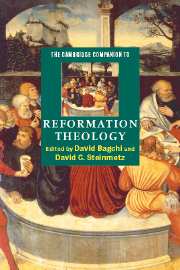Book contents
- Frontmatter
- Introduction
- 1 Late medieval theology
- 2 Lollardy
- 3 Hussite theology and the law of God
- 4 The theology of Erasmus
- 5 Luther
- 6 Melanchthon
- 7 Confessional Lutheran theology
- 8 The theology of Zwingli
- 9 Bucer
- 10 The theology of John Calvin
- 11 John Calvin and later Calvinism
- 12 The theology of Thomas Cranmer
- 13 The theology of the English reformers
- 14 The Scottish Reformation
- 15 An introduction to Anabaptist theology
- 16 Catholic theologians of the Reformation period before Trent
- 17 The Council of Trent
- Conclusion
- Select bibliography
- Index
- Series list
13 - The theology of the English reformers
Published online by Cambridge University Press: 28 May 2006
- Frontmatter
- Introduction
- 1 Late medieval theology
- 2 Lollardy
- 3 Hussite theology and the law of God
- 4 The theology of Erasmus
- 5 Luther
- 6 Melanchthon
- 7 Confessional Lutheran theology
- 8 The theology of Zwingli
- 9 Bucer
- 10 The theology of John Calvin
- 11 John Calvin and later Calvinism
- 12 The theology of Thomas Cranmer
- 13 The theology of the English reformers
- 14 The Scottish Reformation
- 15 An introduction to Anabaptist theology
- 16 Catholic theologians of the Reformation period before Trent
- 17 The Council of Trent
- Conclusion
- Select bibliography
- Index
- Series list
Summary
While it was not until the advent of the works of William Perkins in the late sixteenth century that England produced a theologian of truly international stature, the earlier phases of the English Reformation witness to the work of a number of talented individuals who were able to draw upon that of their continental counterparts and take advantage of the developments in university education in order to articulate distinctively Protestant theologies within the English context. Thus, while the theological contribution of the English reformers was in no way as significant as their innovations in, say, liturgical practice, it nevertheless stood in positive relation to continental movements and defined the kinds of debate that were to shape English church life until the end of the seventeenth century.
ORIGINS
The wider field of the intellectual history of the Reformation has, over recent decades, preoccupied itself with tracing dogmatic and exegetical trajectories back into the theological world of the Middle Ages. Study of the English Reformation over the same period has, however, been to a large extent the preserve of social and political historians with little interest in theology. Their work has tended not to take English Reformation theology seriously in terms of its place within the ongoing Western tradition of thought. In addition, the slight and occasional nature of many of the theological productions of the English Reformation, combined with little hard evidence (for instance, in the form of citations) regarding relations to late medieval thought, has made such study almost impossible to raise above the level of educated guesswork.
- Type
- Chapter
- Information
- The Cambridge Companion to Reformation Theology , pp. 161 - 173Publisher: Cambridge University PressPrint publication year: 2004



